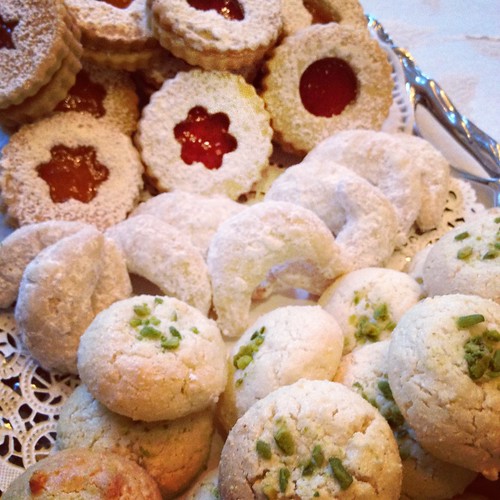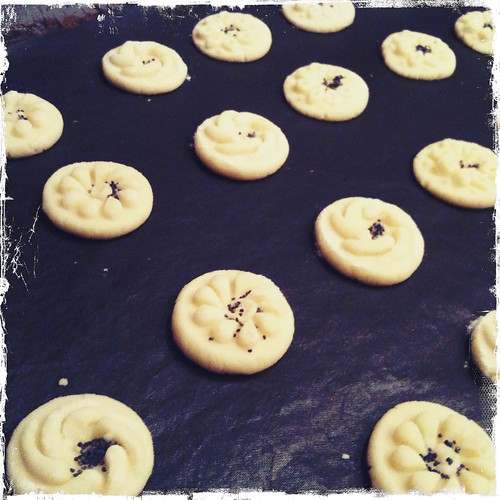Some of the mother's famous cookies. I will get to them all soon. Patience people.
The Equinox happens tonight; officially it is the start of the Persian New Year, but a tad too late in Seattle for anything but a few phone calls and kisses around the family. Tomorrow night, I will be going to my parents for a dinner replete with all the traditional foods – the kuku sabzi, the sabzi polo and the smoked white fish with herbs (mahi bah sabzi). Yes, it’s all about herbs and green, a meal that Kermit the frog would love. However, this is just the start, the holiday continues with open houses galore – “Aid Deedany”, where you go visit your relatives, the older ones first out of respect, and then you move on to see your friends far and wide. In Iran, it is a two week process, here we try and do it in a few weekends. Most of the visits are after dinner – usually tea, fruit, ajil and an array of cookies. My parents are hard to pin down during these few weeks; they are out and about doing the rounds. Good for them. Spring is a great time to start emerging from the Seattle Slumber. The Slumber is the time between November 5th and March 20th, when most of Seattle goes into seclusion to only come out for special occasions – winter beer releases, Husky basketball games or to piss me off in line at the airport. Now is the time for all good people of Seattlandia to get out of your house and attempt to become one with your friends and neighbors, use this as a great excuse. I miss you all, really.
My mom makes a nice array of cookies for the holiday (pictured above). Persians are not big on chocolate, nor cheesecake or any strange concoction that we are likely to call dessert at the big table. They are big into orange blossom, rose water, honey, cardamom, almonds and walnuts along with delicate fruit flavorings. Some of their inspiration comes from the French with pate au choux and mille feuilles, but mostly are just plain Persian.
Cookies getting ready to hit the oven.
One of my favorites is “nooneh berenji” or rice flour cookies. These are amazingly delicate and powerful little cookies that melt in your mouth. You would have no idea that they are rice flour, they have a nice subtle rose water flavor with a little cardamom added for punch. They do not travel well, but they are worth picking up at a Persian grocery store when you can find them. If you don’t have one around, try making them. A plus is that they are gluten free. Since I am not a fan of making things with ingredients that are not easily found within a reasonable roaming radius of home, these are pretty swell. It does require learning how to clarify butter, which is something I had never done before, but a New Year means learning new things, doesn’t it?
Fancy cookie press made my Mr. S.
Nooneh Berenji – Rice Cookies topped with poppy seeds
Makes 5 dozen
This recipe requires two things – one is learning how to clarify butter and the other is to have a wooden cookie stamp. If you don’t have one on hand, I would just roll cookies into a ball, make a tiny indentation and then press the poppy seeds into the indentation. My mom has a little collection of the cookie stamps, they are made from wood, a husband of a friend of hers likes to make them. You can find glass and pottery ones at Amazon, Williams-Sonoma and some specialty cookware shops around your neck of the woods The trick is not to press down too hard, you want the cookies about ¼” thick after stamping.
Ingredients
1 ½ cups (3 sticks, ¾ lb.) unsalted butter
3 egg yolks
1 – 1 ¼ cup white rice flour (portion them as one cup with a ¼ cup measure in reserve)
1 cup confectioner’s (powdered sugar)
1/3 cup rosewater
½ t cardamom
1/4 cup blue poppy seeds
Melt butter over medium heat, let cool. Skim the foam from the top of the melted butter and then either carefully pour to avoid transferring the solids at the bottom to a clean container or sieve the rest of the melted butter through cheesecloth lined strainer. If you are still unsure, please refer to David Lebovitz’s awesome tutorial on the subject.
Prep a baking sheet with parchment paper or Silpat. Preheat oven to 325 F.
By hand or in a mixer, combine butter with egg yolks added one at a time. Really you are not creaming because the butter is not really in a solid form, but you do want them well combined. Next add rose water to butter and egg mixture. Mix until combined. In a separate bowl, mix dry ingredients together, starting with one cup of rice flour and the confectioner’s sugar and cardamom. Add dry ingredients to wet ingredients and mix at a low speed until combined. If the dough seems sticky or wet, add additional rice flour by the tablespoonful until a little more manageable and easily handled without overworking the dough. Remove dough from bowl and start making 3/4” ball from dough and test cookie press to make an imprint. If the imprint works without cracking the dough, then the dough is the perfect consistency. If there is too much flour, add a tablespoon of water, and if it is too sticky, add a little bit of rice flour.
Once you are happy with the consistency you can start making cookies. If you are at a good stopping point, wrap the dough up in saran wrap or a zip lock bag and place in fridge for up to two days. Let come to room temperature before starting to make the cookies.
To make cookies - start rolling the dough into balls, place onto prepared baking sheet with 2” between each cookie and start stamping. Press or sprinkle 10-15 poppy seeds (is that a smidgen) in the center of each cookie. Check around 8 to 10 minutes, depending on your oven, once they begin to get a little golden on the edges, take out and cool on a cookie sheet. Once cooled, store in a sealed container for up to two weeks.


